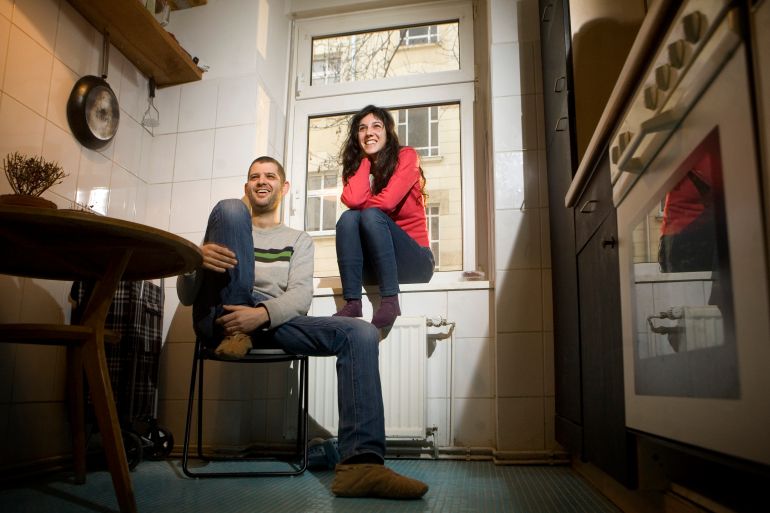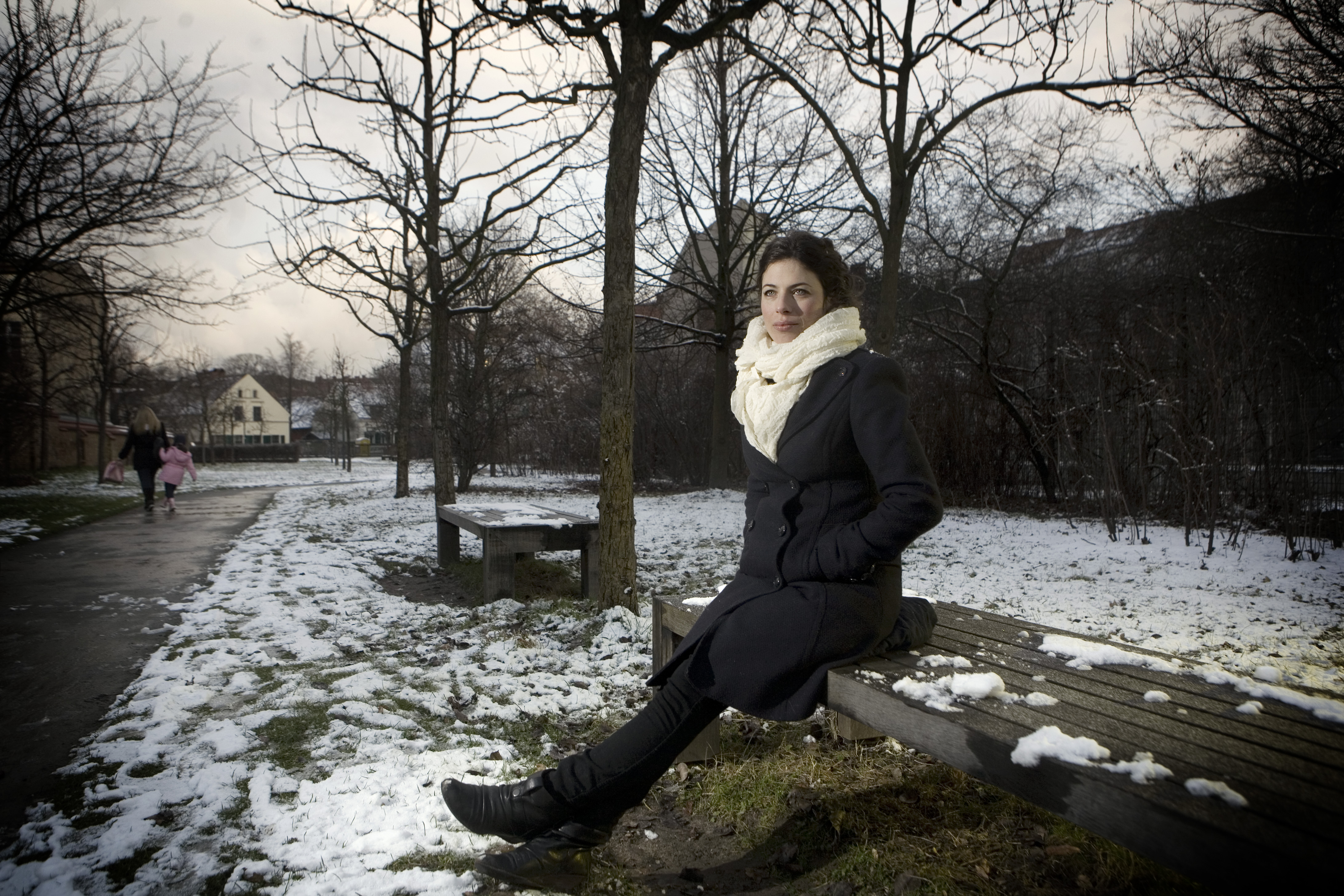Israelis flock to Berlin for better life
Young immigrants find the German capital to be hip and cheap – and still contains traces of its Jewish past.

Their new life began four hours by plane away from Tel Aviv. Everything they owned fit into 23 boxes and two animal cages. Altogether, these weighed roughly 300kg – but the load felt incredibly light.
“It’s strange,” says Avisar Lev, 35, nestling into the snug armchair near the window. “I immediately felt at home in Berlin, for the first time in my life.” When he and his wife, Noa Golan, moved to the German capital three months ago, they only took their most important belongings: their cat Buja and their dog Lucy.
All the restrictions and constraints of their Israeli life were left behind.
When they arrived in Germany in early December, their flat was waiting for them. Noa Golan, a slim 29-year-old with dark hair, had found the ground floor flat in an old building in one of Berlin’s hippest quarters, Neukölln, which is known for its tatty and multicultural vibe. It looks like home: The wooden floors, the stove in the corner of the living room. The firewood stacked between dozens of books they brought from Tel Aviv.
They left Israel for many reasons. “Living became very much impossible in Israel,” says Lev. The couple had saved money in order to buy a flat and start a life together. “But you can’t start a life in Israel,” explains his wife. “If they want, landlords in Tel Aviv can increase the prices for their properties by 200 percent.”
According to Israeli newspaper Haaretz, property prices in Israel’s business hub have risen by 71 percent between 2000 and 2011. In 2012, the price of homes in Tel Aviv rose by an additional 3.7 percent. The rising living costs led to mass demonstrations in Tel Aviv, “but while the whole world was watching it in the news, our government didn’t do anything”, Lev says.
He started looking into flats elsewhere. “There was this buzz about Berlin,” he says. His wife adds: “Everyone who is like us moves to Berlin. It’s cheap and it’s cool.” Over the past decade, the once-divided city of Berlin has become a hub for young liberals and intellectuals from around the globe.
Golan and Lev are just two of thousands of young Israelis who have moved to Berlin. The trend has been going on for some time now, and their numbers are increasing. The Israeli embassy in Berlin puts the estimate at around 15-20,000, but some say they are closer to 30,000.
Exactly how many Israelis there are is hard to pinpoint, however, because many are of European descent and hold European passports – and so they don’t count as “Israeli immigrants”.
 |
| Maayan Iungman moved from Tel Aviv to Berlin just before her 30th birthday [David Oliveira/Al Jazeera] |
“You can compare Berlin to New York City in the ’80s”, says Emmanuel Nahshon, the Israeli embassy’s envoy in Berlin. “The city stands for freedom and tolerance. There are a lot of young people from around the world here, not just Israelis. It is cheap to live and study here and there are many cultural and intellectual activities.”
These are not the only reasons the immigrants have for moving. Lev, who worked as a human rights lawyer for Yesh Din, an Israeli NGO that files petitions against illegal construction by settlers on privately owned Palestinian land, says: “It came to a point where I just felt I had to leave. It’s the way people in Israel treat you; some called me a traitor.” The 35-year-old says he was worried he might be followed or photographed. “If you oppose, the society pushes you aside.”
Berlin has the space to breathe. “I felt Israel was very narrow,” says Maayan Iungman. The actress, model and director moved from Tel Aviv just before her 30th birthday, less than a year ago.
Being abroad made her realise many things: “People here don’t have this stress like we do. Israel is not bad – that’s not what I am saying. But the reality is hard, in a quiet way. It’s hard to make a living. There’s the occupation, the army, the religion. The society teaches you that this is the only place for you and you’re not welcome in other places. It’s a country that is occupying another country and it makes its own people crazy. And I am not even talking about the Palestinian people.”
Iungman fell in love with a German and decided to move to Berlin where her sister was already living. The day she arrived in Berlin was Holocaust Remembrance Day in Israel. It was then she realised that where she was going was a place of the past. “I was picked up at the airport by a German guy who I had spent a night with in Israel, but actually didn’t know – and, yes, it did feel strange. We went to his house and were so close to each other. Then I thought: What would be better to give to this day than love?”
A poll by the Center for Academic Studies conducted in 2011 revealed that 70 percent of Israelis don’t forgive Germany for the past. Many young Israelis have grandparents who either fled or survived the Holocaust. Yet now, some of them are returning to the scene where the atrocities of the Nazis were forged, where Joseph Goebbels declared total war and where the “final solution” to annihilate the Jewish people was determined.
Today, Jewish history is still perceptible in Berlin, a city whose streets are sprinkled with Stolpersteine, small memorials the size of cobblestones embedded in the pavement. The memorials quietly remind you where you are and what happened.
Golan remembers. Her grandmother was born in Berlin, and her silhouette hangs neatly above the couple’s bookshelves. Although Golan’s grandmother left Germany before Hitler came to power, she is fascinated by the history. “I notice everything. When I go for a walk along the canal, I wonder: ‘what have these waters seen?”” And yet, as much as Golan is aware of the history, she thinks it is time to strip off the complex that she finds both Israelis and Germans have. “Come on, it’s behind us,” she says, speaking for many of her compatriots who live in Berlin.